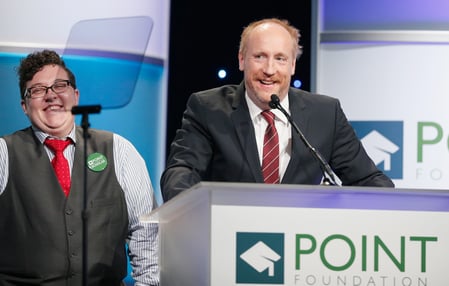When I first discovered the Point Foundation website, I went directly to the list of scholarship recipients, read through every bio, and proclaimed myself inadequate. I “knew” that I couldn’t win when the bios of the recipients were all so impressive, so I immediately told myself that I wasn’t worth that level of recognition. The same thing happened when I looked at four-year institutions and discovered UCLA. I looked at the fact that it was the most-applied-to school in the world, and that the acceptance rates were fairly low for a public institution. Again, I proclaimed myself inadequate and wrote it off as an impossible dream.
I made all kinds of stipulations for myself: I needed perfect grades, an excellent record of community service, leadership positions, awards, other scholarships, experiences. If I could just get that, I would be the kind of person who deserved awards. So I earned perfect grades, volunteered, and found opportunities for leadership. While all of those things were fantastic experiences, the problem was in my thinking—sure, hard work was important, but I was placing my value as a person in my resume, transcripts, and awards.
I was accepted into UCLA, won several scholarships, earned honors, volunteered, and built rapport with my professors and fellow classmates. I applied for the Point Foundation scholarship, made it to the semi-finalist stage, and didn’t advance to the phone interview. So I kept working. I was offered a position as the president of a student organization and was hired by my department. I continued to volunteer, to get good grades, and to work. I published an article in a journal and completed a research study and an honors thesis. I received the Point Scholarship. And after all that, after hitting all of those milestones and completing all of that work, I still felt like the same person…with all those same insecurities.

I experienced what some people refer to as “impostor syndrome,” which isn’t a diagnosis, just an easy shorthand for always feeling like you’re a fraud, and you’ll be found out at any moment. I constantly questioned myself, wondering if the things that I earned just came to me through luck. Did I get a scholarship because I earned it, or because the applicant pool was so small that they just didn’t have anyone else to give it to? Did I get a good grade because my work was good, or because my teacher just skimmed it and decided it was good enough? Was my research good, or were my advisors just humoring me? Sure I volunteered, but other people volunteer more, work harder, accomplish more…no matter what I did or how much I accomplished, that little voice in my head could always leave me convinced that I didn’t deserve any of it.
I guess some part of me thought that if I could just accomplish fill-in-the-blank, I would know that I was a worthwhile person. And that blank could be filled with anything, depending on the moment. The trouble was that as soon as I filled that blank, the accomplishment would vanish under the weight of that inner voice telling me all of the reasons why it didn’t count. Even being awarded a Point Foundation scholarship didn’t quiet that voice…a fact that became clear when I started working on grad school applications and immediately thought of many, many reasons why I didn’t deserve to be accepted.

From my observations, I’m not alone in feeling this way. As queer folks, we’re at much greater risk for things like abuse, bullying, and other traumas. At the same time, we live in an often-hostile culture…one that doesn’t magically become friendlier simply because we’ve gained the right to marry or serve in the military. Further, in our culture, successes are seen as a direct result of hard work, and failures are seen as deeply personal. Marginalization increases these feelings of inadequacy, and sometimes even small, personal emergencies can result in extremely severe consequences.
I wish I could say that there is a simple solution, or even that I had completely overcome these feelings of inadequacy. The truth is that I have spent the last several years working to develop my own personal sense of identity, self-compassion, self-acceptance, understanding, and awareness…and sometimes, I still feel like a fraud. But those feelings come less often, and when they do come, I can recognize them for what they are. When I did my Ph.D. applications and felt the familiar taste of impostor syndrome on the back of my tongue, I knew to go to my support network. I sought my friends and my mentors, who I knew I could trust, and talked through it. I reminded myself that it was a feeling, and that feelings do, in fact, pass. I expressed my feelings in ways that worked for me. I tried to be present, to be compassionate, to let go.

Eli Lawliet and actor Matt Walsh speak onstage at the Point Honors gala
Just a few days ago, I found out that I had received acceptances from at least two of the four schools that I applied to. Though I am still waiting on a few more schools to get back to me with their decisions, my deepest fear—that no one would accept me into their program—is no longer an issue. Having that security feels great…but I am still the same person. Being accepted into Ph.D. programs doesn’t make me better, or more worthwhile, or worthy than I was before, just as being denied from those same programs wouldn’t make me a bad or worthless person.
When I first looked at the recipients of Point Foundation scholarships, with their impressive bios and smiling faces, I never would have thought that any of them shared the same insecurities as I did. So if you’re a prospective applicant, and your inner voice is feeding you those same lines, know that even people with smiling pictures and impressive bios struggle with insecurities. Love yourself, not because of what you have accomplished, but because you are worthy of love.
 This post was written by Point Scholar Eli Lawliet.
This post was written by Point Scholar Eli Lawliet.
Eli is studying Gender Studies at University of California, Los Angeles. In the future, Eli plans to pursue a graduate degree in public policy and sociology so that he may continue advocating to make the world a better place for trans people across the identity spectrum through research and policy.

